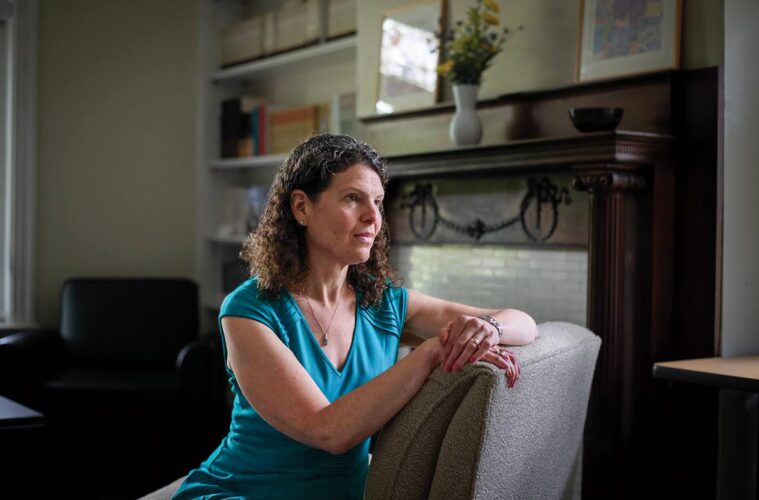Emily Loeb ’98 is the director of programs and education at the Holocaust Center of Pittsburgh.
When Emily Loeb ’98 began telling the story about her grandparents’ escape from Nazi Germany to students in the Pittsburgh schools, she didn’t know exactly how many of her family members had been murdered in the Holocaust.
But after a high school student asked the question during one of her presentations, Loeb decided to dig deeper. She contacted a friend and former math teacher in Geilenkirchen, Germany, who has been helping Jewish families trace their descendants from that town and asked him to do some research.
His answer astounded her: 141 members of her family had perished in the Holocaust. “I was both shocked and sad,” she says. “It’s a huge number.”
After sharing her family’s story with thousands of people as a volunteer with the Holocaust Center of Pittsburgh, Loeb decided to apply for a job at the center. Since January 2023, she has served as the director of programs and education and now dedicates her career to connecting the horrors of the Holocaust with the injustices of today.
In addition to creating educational programs about the Holocaust, Loeb has also worked on projects that teach people to stand up to antisemitism. That has been a painful topic in Pittsburgh, where 11 people were killed by a gunman during Shabbat morning services in 2018 at the Tree of Life synagogue — the deadliest attack on the Jewish community in the United States.
To honor the victims, a new nonprofit organization is redeveloping the Tree of Life building as a museum, a sanctuary, and an education center, a project that is scheduled to break ground this spring. Now located at Chatham University in Pittsburgh, the Holocaust Center will become an integral part of the reimagined space and offer educational programming on antisemitism and hate-based violence.
“The goal is that people will tour the exhibit or attend a lecture, film, or symposium [at the building] and then feel enlightened or empowered to become an active participant in efforts to rebuild a world without antisemitism or identity-based hate,” Loeb says.
While most of her work has focused on Holocaust education projects, Loeb has also served as executive director of a foundation that has funded environmental and social justice initiatives at Jewish organizations across the country. Called the Gendler Grapevine Project, the foundation is named for Loeb’s late uncle, Rabbi Everett Gendler, who was active in the civil rights movement and was an advocate for environmentalism in Jewish communities.
For Loeb, her uncle embodied many of the interests she embraced while a student at Colgate, where she majored in geography and minored in peace studies. After her junior year, she spent the summer in Idaho working with activists who were trying to stop logging in a forest located between two wilderness areas.
When she returned to campus her senior year, one of her geography professors recommended that she use the experience as the basis for her thesis. “I was really encouraged to take my personal interests and embed them in what I was learning and exploring at school,” she says, “and I think I carried that through professionally.”
Since it was founded in 2012, the foundation has awarded grants to 43 environmental and social justice initiatives. One of its projects was funding a youth leadership educational program for Jewish and African American teens in Baltimore to learn about each other’s traditions and cultures.
Loeb’s passion to help others has also extended to young women who are first-generation college students in a project she founded in 2017 with two Colgate classmates — Adonal Foyle ’98 and Shiyana Valentine-Williams ’98. The trio created a grassroots fund to provide scholarships to women age 28 or younger to help them attend college. Another friend, Jenny Newcomer ’98, has donated a daily planner from her company, Commit30, to every scholarship recipient.
Over the past six years, the Shattering Glass Ceiling Scholarships have been awarded to 75 women across the country. “It’s one of the things I’m most proud of,” Loeb says, “mainly because it’s a project of my heart.”

